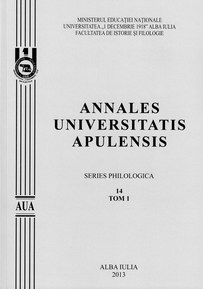Raţionalism cultural în eseul românesc interbelic. Mihai Ralea
Cultural Rationalism in the Romanian Essay Writing in the Interwar Period. Mihai Ralea
Author(s): Ileana GhemesSubject(s): Literary Texts
Published by: Universitatea »1 Decembrie 1918« Alba Iulia
Keywords: Romanian culture; national identity; interwar period; Mihai Ralea
Summary/Abstract: Educated within the frame of the socialist positivism with ’Viaţa românească’ (‘The Romanian Life’) (1927), a supporter of the militant peasant-oriented movement, of the agrarian interwar socialism, Mihai Ralea rejected cultural exclusivism and expressed a positive attitude as towards the culture-civilisation independence under the shape of adaptability. In Fenomenul românesc (The Romanian Phenomenon) (1927), he was preoccupied with the defining of the Romanian soul and with the modality in which it shaped the world, with the faiths, illusions, hopes and myths of the Romanians. To Mihai Ralea, the justification of the Romanians as ethnic unity was conditioned by the accomplishment of the national cultural values, the point of departure being the handicap of being left behind from the rhythm of the cultivated countries in terms of centuries of civilisation. He saw the Romanian space as ’a corridor of passage for the peoples between East and West’ and identified the values of the Romanian specificity as a result of the influences and contributions exercised by the ’activist voluntarism of the West’ and ’the fatalist passivity of the East’. By means of adaptability, the Romanian soul assimilated the influences favoured by its affective and spiritual functions, designing a new synthesis, a balance between two extremes. Mihai Ralea distinguished between two types of adaptability: the former, closer to the Eastern one, more passive, represented by the Moldavian and the Bessarabian types, and another one, closer to the Western one, more active, represented by the Wallachian and the Transylvanian types; an intermediary type would be the mountainous one, corresponding to the region of Muntenia. For the future of the Romanians, adaptability could represent a ’double-edged sword’ as it virtually contained both the potential of progress, and that of decadence.
Journal: Annales Universitatis Apulensis. Series Philologica
- Issue Year: 14/2013
- Issue No: 1
- Page Range: 19-28
- Page Count: 10
- Language: Romanian

